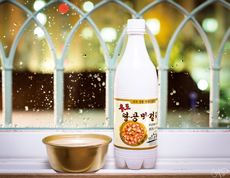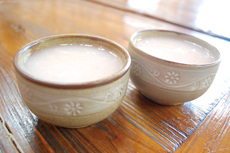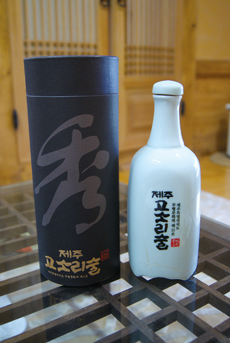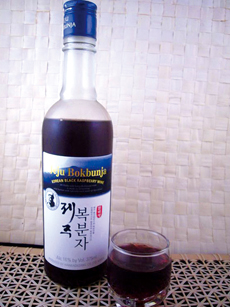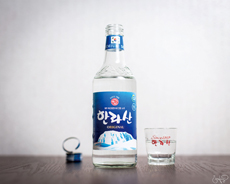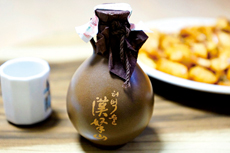|
Peanut Makgeolli
Sold in big marts and some restaurants.
800ml / 5,000 won / 6 percent (Photo: Eric Hevesy)
Traditionally made from rice or wheat mixed with the microbiological culture, nuruk, this milky and sweet drink translates as “coarsely filtered.” Popular with Korean pancakes, it is often flavored with local produce and on Jeju this means Udo peanut (ttangkkong) and also mandarin (gamgyul).
Swindari
Mostly homemade and sold in a few restaurants.
2l / 5,000 / 1-2 percent
Swindari is a low-alcohol homemade beverage once made in every household when food storage was difficult. Jeju people thus add nuruk to rice and barley for fermentation and sugar is added to taste, making this a comforting drink whether served hot or chilled.
Gosorisul
Seongeup Folk Village, Seogwipo City (010-8664-3296)
400 ml / 50,000 won / 40 percent
Omegisul is a traditional millet-based drink similar to makgeolli. Relatively weak, when traditionally distilled it becomes “gosorisul,” a 40-percent beverage.
Once used for ancestral rites and at shrines on Jeju, it was almost lost before it was designated intangible cultural asset no.3 in 1985. Soju is the modern incarnation of this traditional drink.
Bokbunjaju
Some marts and restaurants
375ml / 7,500 won / 16 percent
Raspberry wine is a Jeju specialty, and locals say it is sweeter and cleaner than the varieties grown in North and South Jeolla Provinces due to Jeju’s pristine spring water. This deep red beverage is thought to be fortifying and good for male “stamina.”
Hallasan Soju
All marts and restaurants
360ml / 2,500 won / 21-22 percent (Photo: Eric Hevesy)
Being 1 or 2 percent stronger than mainland sojus, this brand dominates the local market with two main varieties. Fully exploiting Jeju’s reputation for clean water and distinctiveness, recent advertizing slogans include: “As Dokdo is Korean land, Hallasan is Jeju soju,” and “The people are different, the water is different.”
Heobok Sul
In big marts and a few restaurants
2l / 5,000 / 15 percent
This distilled soju is made traditionally from brown rice and barley. The fermented brews from each are made individually and ripened in oak casks for three to five years before canola honey is added. |










